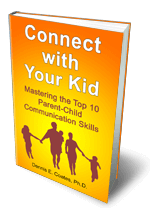What every parent knows: unconditional love is the foundation.
But child misbehavior can temporarily make it hard to access this love, much less express it. In its place, your instinctive negative reaction: frustration, fatigue, disappointment, discouragement, hurt, anger – or even resentment. For the moment, focused on your own state of mind, you feel distanced from your child. You feel the impulse to express what you’re feeling, even if deep down you know this will only make the situation worse.
How long will this estrangement persist? You know from experience that you’ll eventually get your loving feelings back. But when? And what about your child?
The answer: If you can express empathy for what your child is experiencing – almost instantly.
But how can you quickly go from feeling upset to feeling empathy? In my experience, this happens in three steps, which need only take a moment:
- Be “in the moment” with your child. Empty your mind of every thought and feeling about what happened. Let it all go completely as you consciously focus on who this young person is, this separate human being who is experiencing a day in the early years of his or her own life journey.
- Imagine what your child is feeling. Put yourself in your child’s situation. Not to agree or disagree, not to judge, but simply to be aware of and understand the child’s experience.
- Say what you believe the child is feeling. “You must be disappointed when your father doesn’t show up for your game. You wonder if work is more important to him than being with you.”
As you shift your focus from yourself to your child, you’ll sense who he or she is in that moment. This will make it easier to appreciate your child’s feelings and let go of your own negative feelings, which makes it easier to forgive and be understanding. You’ll remember that even in the best case it will take at least 20 years for the young person to mature into the kind of adult who consistently reacts to situations the way you’d like them to.
Instead of feeling in conflict, your child will get the message that you appreciate their needs. This desire to be understood is why they got emotional in the first place. Expressing empathy is like shutting off the oxygen that fuels the fire. You feel the love again, and so does your child. With emotions cooled, you can give nonjudgmental feedback, reaffirm your expectations in a kind way, or encourage them to deal with their problem.
Try it sometime. Each time you do, it’ll get easier to do this effectively. By the way, empathy works great with spouses, too.
 More truth-telling about parent-teen communication.
More truth-telling about parent-teen communication.
My how-to instruction on expressing empathy is the topic of Chapter 4 of Connect with Your Kid: Mastering the Top 10 Parent-Child Communication Skills.
You can grow the bond with your child through better listening. Download the FREE ebook, Listening to Understand.

